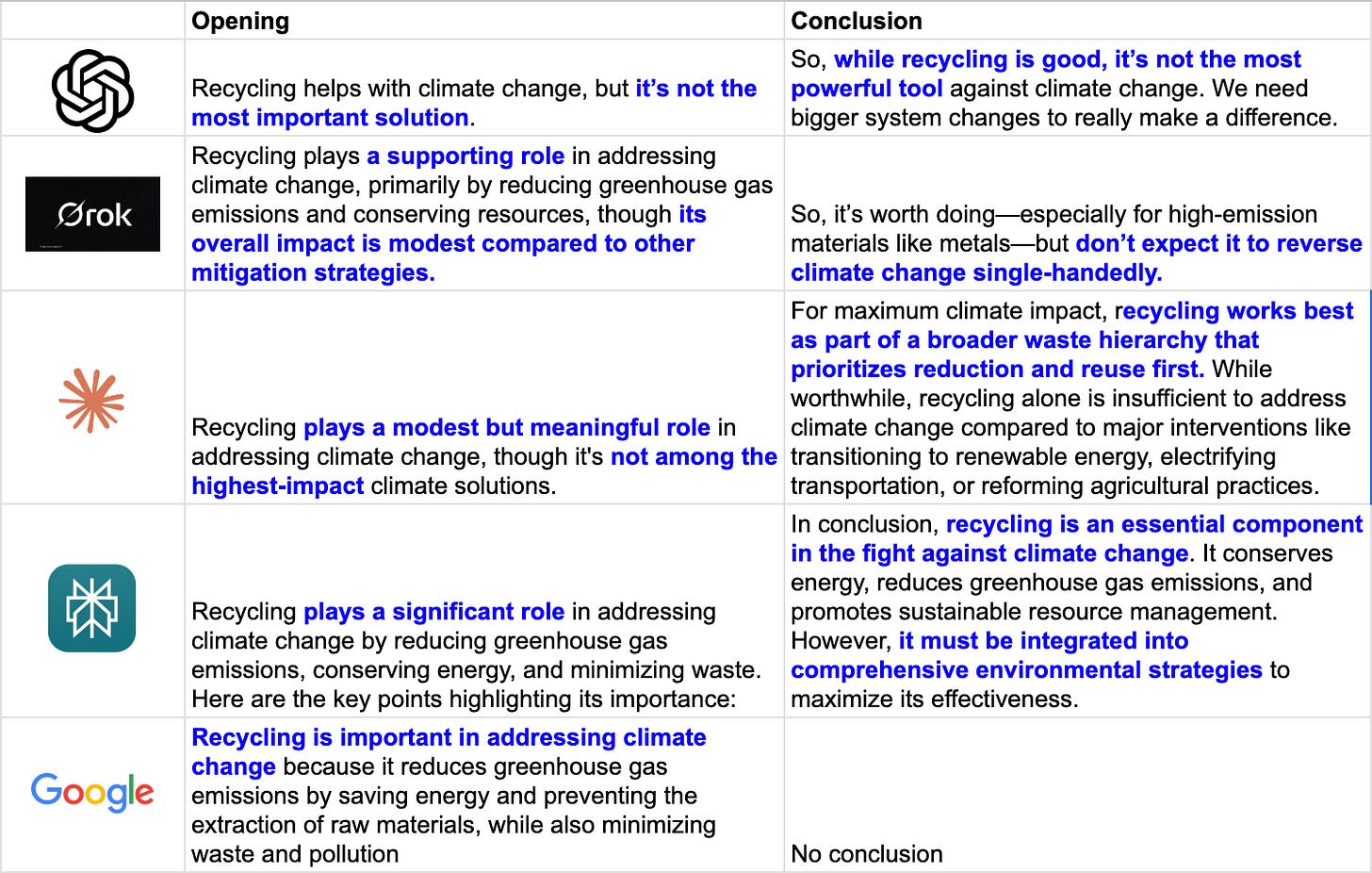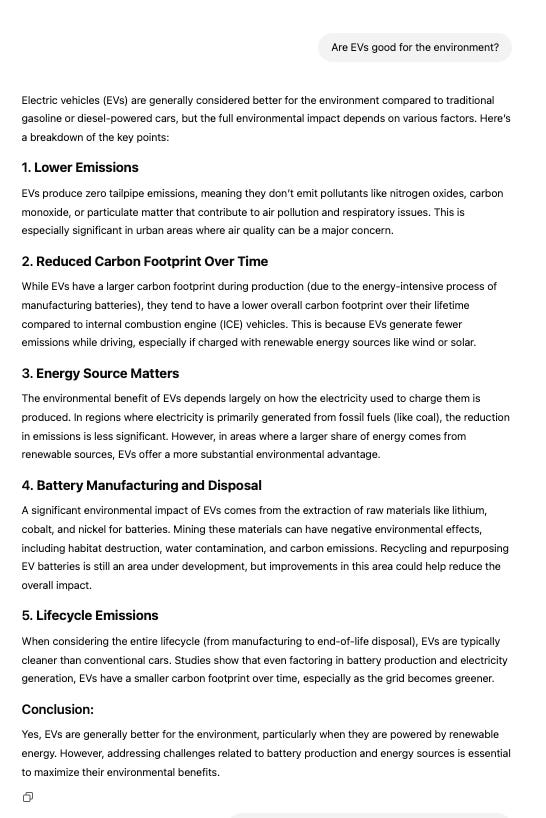I asked an AI Chatbot: How important is recycling to address climate change?
Since I was running out of humans to talk to about climate change, I started talking to AI chatbots and here's what I found
Folks these days probably talk more with AI chatbots than other humans (or we’ll get there pretty soon is what I am told). And for long now, we’ve trusted the internet more than Dad’s ‘back in my day’ rants anyway. So I figured questions around climate change - ‘does recycling even matter? are EVs actually good? Is climate change a hoax?' - would inevitably land in their digital laps as well. So, I rounded up a bunch of AI bots and threw some noob climate questions their way.
The results were both revealing and concerning—some chatbots provided well-researched, science-backed answers, while others delivered vague, outdated, or even misleading information.
And this is a glimpse of what I found.
Note: This is not an in-depth analysis across a wide range of questions, but just some preliminary findings from a few questions I tried.
#1: There is a fair amount of variation for the same question across different chatbots. Some answers completely lack nuance!
I am going to use as an illustration the answers I received when I asked “How important is recycling to address climate change?”
Broadly the answers revolved around the benefits and challenges of recycling. However, not all bots covered both sides and covered them with the same nuance.
So while ChatGPT, Grok and Claude presented a balanced view and spoke about both benefits and limitations, Perplexity touched upon it only in conclusion with no details and Google AI didn’t touch upon challenges at all!
Even while talking about the challenges or limitations, only GPT actually touched upon the elephant in the room: Consumption! It includes the sentence “It doesn’t stop overproduction and overconsumption—the biggest climate culprits.” None of the other bots even mention consumption.
Everyone (except Google) spoke about the obvious one ‘that recycling also needs energy’, but only GPT and Claude brought up downcycling i.e. the recycled material is usually of lower quality than the original material.
Also, Grok had the highest amount of numerical data points to support its statements, such as ‘only 9% of plastic actually gets recycled’ or ‘recycled plastic production emits roughly 1.5 tons less CO2 per ton compared to virgin plastic’. Some of these data points are important in making the scale of the problem evident to the reader. So saying ‘only 9% of plastic gets recycled’ is much more impactful than saying ‘Not all plastic gets recycled’
Here’s a summary of the responses:
The full text of the actual answers can be read here
#2: The tone of the answer varies, especially when one compares the opening and closing sentences that kind of sets the tone for the reader
In the case of GPT, Grok and Claude the tone was very clear - “Recycling is a solution but clearly not a silver bullet and not as impactful as it is often made out to be”
The others were much more positive to begin with.
Most of the closing sentences tried to offer a balanced view (except Google AI which did not have a conclusion at all) but without the nuance of what the limitations actually are, it doesn’t convey the full picture!
Comparing the opening and closing sentences is a good way to compare the tone they set.
#3: The answers were slightly different when I asked the same question through a logged in profile and Incognito
I could do this with GPT, that lets you search without signing in.
With my Logged in profile (which I have been using for a while, so it probably knows I work in climate):
Without logging in (Incognito)
While the opening and conclusion are similar and both answers talk about challenges as well.
The proportion of the answer that focuses on benefits v/s challenges is very different. While lesser number of words, the first answer feels more nuanced than the second one.
The incognito answer doesn’t call out that the real challenge is overconsumption as clearly.
I did the same thing for another question: Are EVs good for the environment?
With my Logged in profile (which I have been using for a while, so it probably knows I work in climate):
Without logging in (Incognito)
Again, the proportion of the length of the answer on benefits v/s challenges is different. The first answer is a lot more nuanced compared to the second one.
A few concluding thoughts
We definitely need to bring in more nuance when it comes to answering questions around the climate crisis or sustainability. We need to make sure that at least a balanced view gets presented and some critical perspectives are not missed. Can better prompt engineering solve it?
Customization or personalisation has been an increasingly critical part of our world, so the difference in results is not surprising at all. However, should the answer to the questions “How important is recycling in addressing climate change” be different for different people based on their context? This is sounding a little bit like being told what you want to hear.
These are findings from a very small experiment I did and would love to hear if you have thoughts, suggestions or questions that could help guide my way further into this topic. Do leave a comment or reach out if you work in this space and are open to having a chat!











This is interesting. It is after all a language model but if it caters to the audience, its research output should be scrutinised.
My daughter said she asked a Chemistry question to GPT and it gave a detailed explanation but the answer was wrong. When she pointed it out, GPT worked backwards and changed its entire logic to explain the right answer.